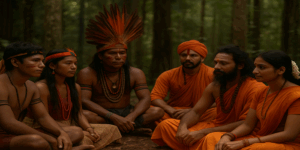The realities of diet in India are far more complex than Westernised notions will grant.
The U.S.’s National Public Radio (NPR) recently featured an article entitled “Egg War: Why India’s Vegetarian Elites are Accused of Keeping Kids Hungry.” On the face of it, the concern expressed by the writer was legitimate: the nutritional needs of poor schoolchildren in Madhya Pradesh following the State government’s decision to remove eggs from the menu.
But, as the rather judgmental term “vegetarian elites” suggests, the article seems to be more about perpetuating a common misperception in reporting on India, that somehow vegetarianism is an “upper caste” Hindu ploy to make the poor in India starve. After all, just a few days before that, The New York Times addressed the beef ban issue with the headline, “Saving the Cows, Starving the Children”, complete with a photo of a woman offering a pranam to a cow.
The irony, as readers have pointed out already, is that both NPR and NYT have usually been liberal when it comes to coverage of the disastrous implications of a global meat diet for the environment, not to mention animal lives.
When it comes to India though, not only have these environmental and animal ethics aspects been ignored, but a wholly insulting edifice of distortion and disdain has been erected on that silence about what “diet” issues are all about.
Using the cliched and colonial trope of starving children, we are offered one more lesson in how Hinduism is somehow responsible for all that is wrong in India today.
Wrong formulation
Let us examine the idea of “vegetarian elites” more closely. This has become a part of commonsense in the West, and in the well-educated sections of the Indian intellectual and media communities too. As the NPR article says, quoting a much cited 2006 survey of diet in India, “vegetarianism is limited to privileged, upper caste Hindu communities.” Given the general association of diet and caste in India, this might appear to be true, and sustain the whole accusation of a vegetarian elite making children starve.
However, what this formulation misses out on is one key question: how vegetarian really are Indian elites? If you walk into the mid- to upscale restaurants or in many of the hundreds of malls that dot urban and small town India today, where the “elites” go to eat, do you see the majority really eating only vegetarian food?
On the contrary, the more expensive the place, the more likely it is skewed heavily towards non-vegetarians. It is not just about personal choice either, but a social and demographic reality. If you look at the most influential, and politically powerful communities in most States in India today, is their “traditional” diet likely to be vegetarian or non-vegetarian?
For example, in my home state of Andhra Pradesh/Telangana, the ruling elite castes are non-vegetarian. Those that are traditionally vegetarian are probably a minority among them.
Read: Is India an egg-eating country?
Conversely, if “vegetarianism is limited to privileged, upper caste Hindu communities”, how do we account for a vegetarian Prime Minister who happens to come from a less than privileged, backward caste background? How do we account for the saints, gurus and just ordinary people from slums and villages who renounce meat for its innate violence?
And even among Hindus who do eat meat, how do we account for the fact that for many of them there is a great deal of traditionally ingrained respect in their practices about what, when, and how much they would eat? None of these realities is considered when what is being produced in reportage is not so much an honest discussion but a relentless perpetuation of Hinduphobia.
“The realities of culture, ethics, and diet in India are far more complicated than what some static and simplistic four varna oppressor model taught to middle school American children might proclaim.”
Hinduphobia needs to be understood not only as a systematic denial of Hinduism in academic and media discourses, but also as an integral part of a broader distortion in the global, modern commonsense on nature, animals, diet, and life itself.
By reducing social problems, even serious ones like malnutrition, to an ahistorical fantasy narrative that blames Hinduism, and by failing to introspect on the assumptions about carnivory formulated in other lands and times, the “Hindu elite vegetarian myth” feeds a failing propaganda for violence.
The effect of such pronunciations is palpable. It is not surprising to find Western readers, unaware of the nuances of Indian culture, jump to offer simplistically, racist comments like “lose the religion and eat some beef,” even on the usually intelligent media like NPR.
The real need now is for reporters and academics to cultivate enough respect for their work and for the subjects of their study so that something useful can really be done for the children of India, and the world.
Caste in flux
The realities of culture, ethics, and diet in India are far more complicated than what some static and simplistic four varna oppressor model taught to middle school American children might proclaim. The reality neither American textbooks nor national newspaper columnists seem to be aware of though is the fact that castes and cultures have been in great flux in India, traditionally, and profoundly and rapidly so since Independence.
Even if much more still needs to be done for the poorest, the simplistic myth of a static, caste-dictated dietary system cannot be taken seriously any longer. Unfortunately, in the popular Western imagination, caught up with delusions of its own agency and the lack of any such for the other, the realities of Sanskritisation and Mandalisation in India are too much of a headache to acknowledge.
We find that old, pervasive Western notion, the “why don’t the starving Hindoos just eat all those cows instead of praying to them” now informing serious debates on Indian news media as well.
Way of life
The problem today is that the right in India lacks the intellectual resources to invest in an Indic narrative of decolonisation, much as its younger minds want to. Whether it is a cause, or an effect, I do not know, but it also often lacks the heart too to go about what it thinks is a restoration of ancient Hindu glory in a wise and compassionate manner, celebrating its bans not as efforts to help animals or the environment but as lessons taught to “those people”. As someone who sincerely hopes that the right will grow up, I have no hesitation saying that.
The bigger problem though is the intellectual inertia and malaise that has allowed an old, colonial, racist mythology about India to become synonymous with the progressive, anti-casteist position in India today. To put it simply, I think the beef bans and beef festivals both miss the point by fighting over rights (real or imagined) bestowed by the past on the present.
It has to be about the present preparing for a future where one day we might well wake up with a start, as we did about second-hand smoke, about the needlessness of the mass industrial slaughter of animals, birds, and sea-life that we routinely accept as a global way of life today.
For such a realisation to dawn, we have to proceed carefully on how we treat debates about diet and identity and not presume to pass off orientalistic homilies like “In India, you are what you eat” or about how “scriptures (that most of us hardly know or follow) prescribe notions of purity.” We must not dismiss what is perhaps the oldest, living, continuous tradition of vegetarianism in the world as mere superstition.
Such an appropriation and denial though has already happened in Western discourse, which increasingly highlights animal rights but somehow turns its back on India’s past and present.
Eminent scholars like Steven Pinker, after all, hasten to add to their pet theories about how the West helped reduce violence in the 20th century little details like how even if the Hindus avoided meat it wasn’t because of animal rights concerns but just because they believed in reincarnation.
The facts are simple. All of India may not have been vegetarian all the time. But the importance given to vegetarianism in Indian life for the simple reason that our ancestors knew we could live without taking an animal life, is an enormous leap in human civilisation that the modern West has had a very tough time coming around to accept.
Sadly, even as the West is outgrowing the limitations of its own religious and secular mythologies about humans and animals, we find some of our own experts now playing into a medieval mindset, even in the guise of fighting one.
(Vamsee Juluri is a professor of media studies at the University of San Francisco and the author of Rearming Hinduism.)
The Hindu





























